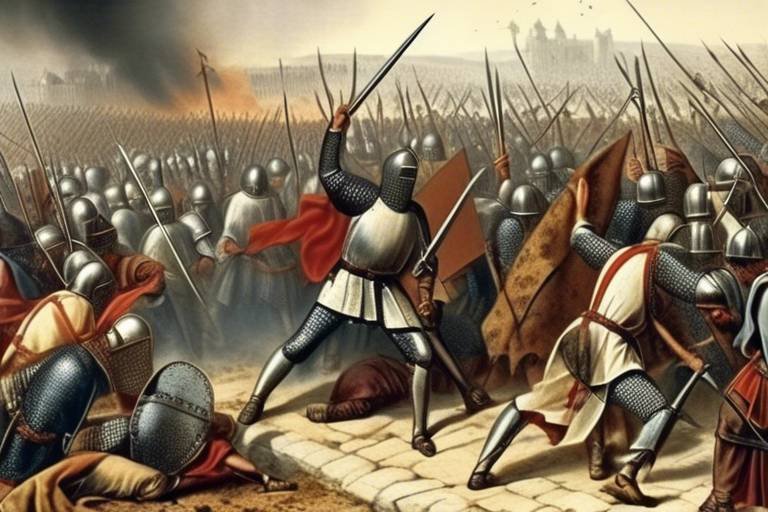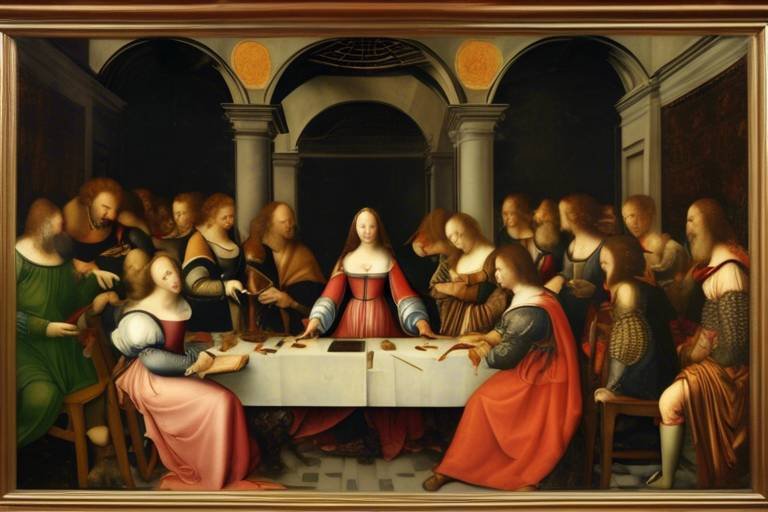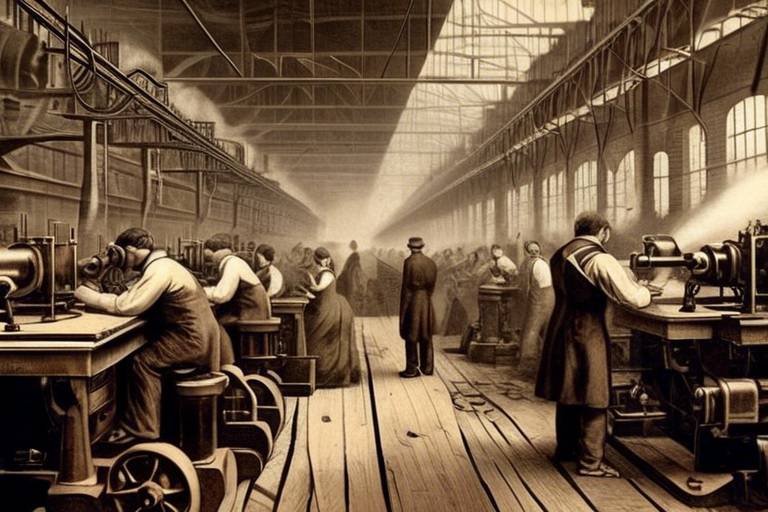The History of the Crusades - Religious Conflict and Its Consequences
The Crusades were a series of religious wars that took place during the medieval period, initiated by the Latin Church with the primary objective of reclaiming the Holy Land from Muslim rule and protecting Christian territories. These military campaigns were not only driven by religious fervor but also by political and economic motivations, marking a significant chapter in the history of Christianity and Islam.
One of the key events that sparked the Crusades was the call to arms by Pope Urban II for the First Crusade in 1095. This marked the beginning of a series of expeditions to the Holy Land, with notable figures such as Richard the Lionheart of England and Saladin, the Muslim military leader, emerging as central figures in the conflict. Their actions and strategies had a lasting impact on the outcomes and narratives of the Crusades.
As these religious conflicts unfolded, they had profound implications for the relationships between Christians, Muslims, and Jews. The Crusades not only intensified religious tensions but also fueled stereotypes and prejudices that persist to this day. The legacy of these conflicts continues to influence interfaith dynamics and global perceptions of religious diversity.
The consequences of the Crusades were not limited to the religious sphere; they also had far-reaching effects on the social, political, and economic landscapes of both the Middle East and Europe. In the Middle East, the Crusades led to significant upheavals, contributing to the emergence of new power structures and shaping the region's trajectory for centuries to come.
Moreover, the impact of the Crusades extended beyond the Middle East, influencing the cultural exchange, economic development, and political dynamics of Europe. The influx of knowledge, goods, and ideas from the East transformed European societies and contributed to the consolidation of power among monarchs and nobility.
Today, the legacy of the Crusades continues to resonate in discussions of religion, politics, and identity. The enduring consequences of these religious conflicts serve as a reminder of the complexities inherent in historical narratives and the enduring impact of religious strife on contemporary perspectives.
1. What were the main reasons behind the Crusades?
2. How did the Crusades impact the relationships between Christians, Muslims, and Jews?
3. What role did key figures like Richard the Lionheart and Saladin play in the Crusades?
4. How did the Crusades shape the social, political, and economic landscapes of the Middle East and Europe?
5. What is the lasting legacy of the Crusades in modern discussions of religion and identity?

Origins of the Crusades
The origins of the Crusades trace back to the 11th century when the Latin Church embarked on a series of military campaigns with religious motivations. These wars were primarily aimed at reclaiming control of the Holy Land, particularly Jerusalem, from Muslim rule. The call for the First Crusade was made by Pope Urban II in 1095 at the Council of Clermont, urging Christians to take up arms and defend their faith by liberating the sacred sites from the hands of non-Christians.
The concept of the Crusades was deeply rooted in the idea of pilgrimage and holy war, blending religious fervor with the desire for territorial expansion. The notion of reclaiming lands believed to be under Christian dominion fueled the zeal of many participants, drawing knights, soldiers, and commoners alike to join the cause.
One of the key driving forces behind the Crusades was the desire to unite the warring factions of Europe under a common goal, redirecting internal conflicts towards an external enemy. This unification under the banner of religious duty provided a sense of purpose and unity among disparate groups, transcending feudal boundaries and fostering a shared identity as defenders of Christendom.
The initial Crusades were marked by a fervent belief in the righteousness of the cause, with participants viewing their actions as a sacred duty sanctioned by God. The allure of spiritual rewards, such as the promise of salvation and the forgiveness of sins, further incentivized individuals to take part in the holy expeditions, solidifying the religious underpinnings of the campaigns.
As the Crusades unfolded over the centuries, they evolved into complex geopolitical endeavors intertwined with religious fervor and power struggles. The interplay of faith, politics, and military ambitions shaped the course of history, leaving a lasting impact on the religious landscape of the medieval world and beyond.

Key Events and Figures
Topics to be discussed in the article include the origins of the Crusades, key events and figures, impact on religious relations, consequences on the Middle East and Europe, and the lasting legacy of these religious conflicts.
The Crusades were a series of religious wars initiated by the Latin Church in the medieval period, primarily aimed at reclaiming the Holy Land from Muslim rule and defending Christian territories.
During the turbulent times of the Crusades, several key events and prominent figures emerged, shaping the course of history. One of the most pivotal moments was the First Crusade, declared by Pope Urban II in 1095, calling for Christian knights to embark on a holy war to recapture Jerusalem. This crusade marked the beginning of a series of military campaigns that would span centuries and leave a lasting impact on the world.
Among the notable figures of the Crusades, Richard the Lionheart, the King of England, stands out for his leadership and military prowess. His clashes with the formidable Muslim leader Saladin are legendary, symbolizing the fierce battles and strategic maneuvers that characterized this era of religious conflict.
The Crusades significantly impacted the relationships between Christians, Muslims, and Jews, leading to long-lasting tensions, stereotypes, and prejudices that continue to influence interfaith dynamics today.
The Crusades left a profound mark on the Middle East, causing social, political, and economic upheavals that reshaped the region's landscape and contributed to the rise of new power dynamics.
In addition to the direct effects on the Middle East, the Crusades had far-reaching consequences on Europe, influencing cultural exchange, economic development, and the consolidation of power among European monarchs.
The legacy of the Crusades endures in modern discussions of religion, politics, and identity, serving as a reminder of the complexities and consequences of religious conflict in shaping historical narratives and contemporary perspectives.
Stay tuned for some commonly asked questions about the Crusades and their impact on history.

Impact on Religious Relations
During the Crusades, the impact on religious relations was profound and multifaceted. The clashes between Christians, Muslims, and Jews not only shaped the historical landscape of the time but also left a lasting legacy that continues to influence interfaith dynamics today. The Crusades exacerbated existing tensions and prejudices among the religious groups, creating a legacy of mistrust and animosity that persisted long after the wars ended.
The Crusades fueled a narrative of religious superiority and intolerance, perpetuating stereotypes and misconceptions that have endured through the centuries. The idea of religious warfare and the demonization of the "other" became entrenched during this period, leading to deep-seated divisions that have proven challenging to overcome. The Crusades set a precedent for religious conflict and intolerance that reverberates in modern discussions of interfaith relations.
Moreover, the Crusades introduced a level of violence and brutality that further strained religious relations. The sacking of cities, massacres of civilians, and desecration of sacred sites deepened the wounds between the different faith communities. These acts of aggression and destruction left scars that have yet to fully heal, contributing to a legacy of resentment and distrust that continues to shape interactions between Christians, Muslims, and Jews.
Despite the passage of time, the impact of the Crusades on religious relations remains palpable. The echoes of those conflicts reverberate in contemporary debates over religious identity, tolerance, and coexistence. The lessons of the Crusades serve as a cautionary tale about the dangers of religious extremism, intolerance, and the consequences of viewing others through a lens of religious difference.

Consequences on the Middle East
The Crusades were a series of religious wars initiated by the Latin Church in the medieval period, primarily aimed at reclaiming the Holy Land from Muslim rule and defending Christian territories.
The Crusades were a series of religious wars initiated by the Latin Church in the medieval period, primarily aimed at reclaiming the Holy Land from Muslim rule and defending Christian territories.
Important events such as the First Crusade led by Pope Urban II and significant figures like Richard the Lionheart and Saladin played crucial roles in shaping the outcomes and narratives of the Crusades.
The Crusades significantly impacted the relationships between Christians, Muslims, and Jews, leading to long-lasting tensions, stereotypes, and prejudices that continue to influence interfaith dynamics today.
The Crusades left a profound mark on the Middle East, causing social, political, and economic upheavals that reshaped the region's landscape and contributed to the rise of new power dynamics.
In addition to the direct effects on the Middle East, the Crusades had far-reaching consequences on Europe, influencing cultural exchange, economic development, and the consolidation of power among European monarchs.
The legacy of the Crusades endures in modern discussions of religion, politics, and identity, serving as a reminder of the complexities and consequences of religious conflict in shaping historical narratives and contemporary perspectives.
The Crusades had profound and lasting consequences on the Middle East, shaping the region in ways that reverberate through history. Socially, the Crusades disrupted the existing social order, leading to a reconfiguration of power dynamics and the emergence of new social structures. Politically, the Crusades destabilized the region, creating power vacuums that were filled by new players, altering the political landscape for centuries to come. Economically, the Crusades had significant impacts, disrupting trade routes and leading to economic shifts that reshaped the economic fabric of the Middle East. These consequences not only altered the physical landscape of the Middle East but also had enduring effects on the region's culture, politics, and society.

Consequences on Europe
The Crusades were a series of religious wars initiated by the Latin Church in the medieval period, primarily aimed at reclaiming the Holy Land from Muslim rule and defending Christian territories.
When examining the consequences of the Crusades on Europe, it becomes evident that the impact was not limited to the distant lands of the Middle East. These religious conflicts had far-reaching effects that reverberated throughout the European continent, influencing various aspects of society and culture.
One significant outcome of the Crusades was the stimulation of cultural exchange between the East and the West. As European armies traveled to the Holy Land, they encountered new ideas, technologies, and goods that enriched their own societies. This exchange of knowledge and resources contributed to the flourishing of trade and commerce, laying the foundation for the economic development of Europe.
Moreover, the Crusades played a pivotal role in the consolidation of power among European monarchs. The need to fund and support military campaigns overseas led to the centralization of authority and the strengthening of royal control. This shift in power dynamics reshaped the political landscape of Europe, paving the way for the emergence of powerful nation-states.
Furthermore, the Crusades fueled religious fervor and zeal among the European population, solidifying the influence of the Church and shaping the spiritual identity of the continent. The Crusading spirit instilled a sense of unity and purpose among Christians, fostering a collective consciousness that transcended regional boundaries.
As a result of these transformative effects, the Crusades left a lasting imprint on Europe, leaving behind a legacy that continues to resonate in the realms of culture, politics, and religion. The echoes of these religious conflicts can still be heard in contemporary discussions of identity, heritage, and the enduring impact of historical events.
1. What were the main motivations behind the Crusades?
2. How did the Crusades impact the relationships between Christians, Muslims, and Jews?
3. What role did prominent figures like Richard the Lionheart and Saladin play in the Crusades?
4. How did the Crusades contribute to the economic development of Europe?
5. In what ways did the Crusades influence the consolidation of power among European monarchs?

Lasting Legacy of the Crusades
The lasting legacy of the Crusades continues to reverberate through history, leaving a profound impact on various aspects of society and culture. These religious conflicts, spanning centuries, have shaped the way we perceive religious differences, political alliances, and cultural exchanges.
One of the most enduring legacies of the Crusades is the lasting divide between different religious communities. The tensions and hostilities that arose during these wars have left a mark on interfaith relations, influencing attitudes and perceptions for generations to come. The Crusades not only deepened the divide between Christians and Muslims but also contributed to the marginalization of Jewish communities in Europe and the Middle East.
Moreover, the Crusades had significant consequences on the political landscape of both Europe and the Middle East. The power struggles and alliances forged during these conflicts laid the groundwork for future geopolitical dynamics, shaping the course of history in profound ways. The legacy of the Crusades can be seen in the complex relationships between nations and regions, as well as in the enduring conflicts that continue to plague the world.
Culturally, the Crusades sparked a wave of intellectual and artistic exchange that influenced the development of literature, architecture, and philosophy. The encounters between different cultures during the Crusades led to the sharing of knowledge and ideas, contributing to the flourishing of creativity and innovation in both the East and the West.
Furthermore, the economic impact of the Crusades cannot be understated. The trade routes established during these wars transformed the economic landscape of Europe and the Middle East, leading to increased commerce and cultural exchange. The legacy of these economic developments can still be seen in the global interconnectedness of trade and commerce today.
In conclusion, the lasting legacy of the Crusades serves as a reminder of the complexities of religious conflict and its far-reaching consequences. By understanding the impact of these wars on society, politics, and culture, we can gain valuable insights into the challenges and opportunities that arise from navigating diverse and often conflicting worldviews.
Frequently Asked Questions
- What were the main reasons behind the initiation of the Crusades?
The Crusades were primarily launched by the Latin Church to reclaim the Holy Land from Muslim rule and protect Christian territories.
- Who were some of the key figures involved in the Crusades?
Notable figures in the Crusades include Pope Urban II, Richard the Lionheart, and Saladin, who played significant roles in shaping the course of these religious conflicts.
- How did the Crusades impact religious relations?
The Crusades had lasting effects on the relationships between Christians, Muslims, and Jews, leading to tensions and prejudices that continue to influence interfaith dynamics today.
- What were the consequences of the Crusades on the Middle East?
The Crusades caused social, political, and economic upheavals in the Middle East, reshaping the region's landscape and contributing to the emergence of new power structures.
- How did the Crusades influence Europe?
In addition to impacting the Middle East, the Crusades influenced cultural exchange, economic development, and the consolidation of power among European monarchs.
- What is the lasting legacy of the Crusades?
The legacy of the Crusades continues to shape discussions on religion, politics, and identity, highlighting the complexities and consequences of religious conflicts in historical and contemporary contexts.



















